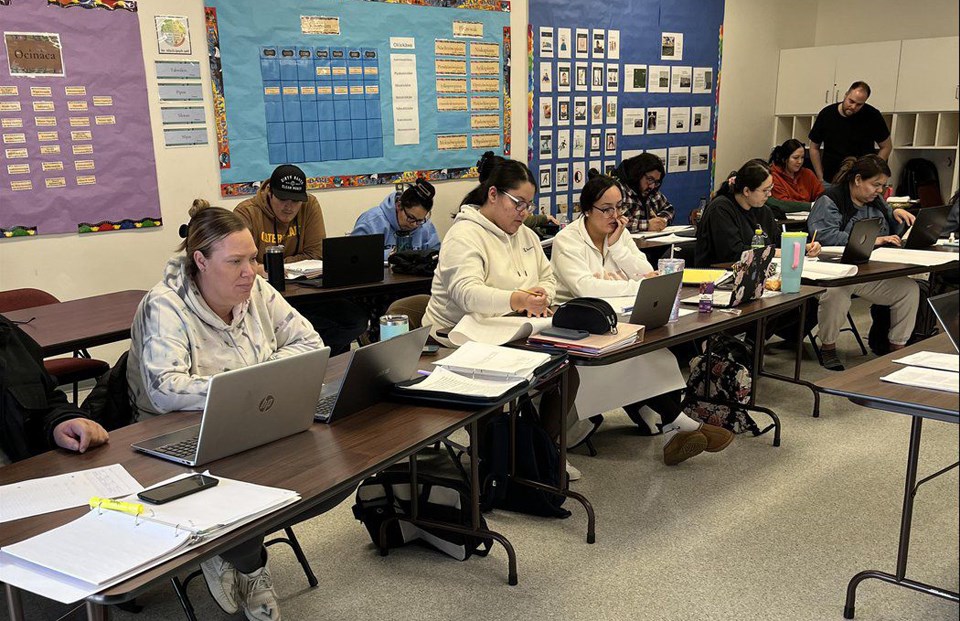BEAUVAL — Post-secondary students in northern Saskatchewan returned to classes last week following the conclusion of a successful first term for the Northwest Saskatchewan Teacher Education Program (NWSTEP) in December.
NWSTEP is a fully-accredited degree program which is currently running in Beauval, allowing students to pursue a four-year Bachelor of Education closer to home than they would have been available otherwise.
NWSTEP program co-ordinator Beverly McLean was hired by Northern Lights School Division on Aug. 1, with the program starting in September. She said Beauval was the ideal spot because of its centralized location.
The program brings in students from surrounding communities such as Ile-a-la-cross, Canoe Lake, Green Lake and others. McLean said the 19 students accepted into the program did exceptionally well in the first term as the first cohort of students.
"The desire and the determination for success is so strong with this cohort,” she said.
“They just go above and beyond to get things done. They're constantly working the classroom here in Beauval.”
McLean is there as the co-ordinator every day and says she is amazed by what the students are doing.
"They're here every day working on assignments, providing each other with supports,” she said.
"It's such a wonderful learning environment.”
McLean said students have a major or minor in Indigenous studies and Indigenous languages and learn Bachelor of Education courses as offered through the University of Saskatchewan.
McLean said that they also have a Zoom instructor in English, Roger Mortimer from Prince Albert. McLean acts as program co-ordinator and is the Cree course instructor.
McLean is a teacher by profession, having spent 20 years at the high school in Ile-a-la-Crosse, including time as vice-principal.
"I just came to end my career on a different note,” she explained. “Northern Lights hired me to come and co-ordinate this program, and here I am in Beauval. I commute every morning, go home every evening.”
The program is sponsored by Northern Lights School Division No. 113 and is offered in partnership with the University of Saskatchewan and the Métis Nation of Saskatchewan.
Her commute with the ice road and bush road is about 40 minutes, which is similar to what students who commute from outlying communities do each day.
McLean said one advantage of the program is that it offers students plenty of support.
"They don't have to uproot their families and move them off to the city,” she said. “They wake up in the morning, send them off to school, come to school themselves and go home in the evening to their families. I think the success we are having is because there are no barriers. Any time we have a barrier, we do everything that we can to ensure that the needs are met.”
McLean said both the Northern Lights School Division and USask are supportive. Her main contact at USask is Director of Undergraduate Programs Arvelle Van Dyck.
"She provides us all the support we need with programming, so it went really well,” McLean said. “I was so impressed with the first term. When the mark started coming back I was so impressed.”
McLean said students who graduate from the program can potentially help alleviate the teacher shortage in Northern Saskatchewan.
"There's teacher shortage, province-wide, right? But it is a little bit more pronounced (in the north),” she said.
According to a release from the Northern Lights School Division, students see the advantages as well.
“I have always wanted to go back to school to pursue my Bachelor of Education so I was very excited to see that the NWSTEP program was 小蓝视频 held here in my hometown,” first-year student Kristal Krivoshein said.
“This is such an amazing opportunity, and I am very excited to be a part of this class and to grow and learn alongside my classmates. It’s not every day we have programs 小蓝视频 offered this close to home.”
“What inspired me to pursue teaching as a career was the memories I had of my past elementary teachers and certain things they did that made an impact in my education,” fellow student Chyenne Opekokew added.
“I chose this program as it was close to my hometown and close to my family in the north. Having this program close to home also makes it more affordable and brings people from different communities together.”




